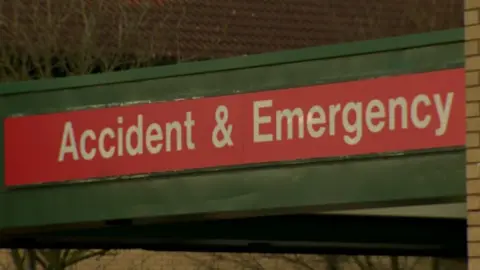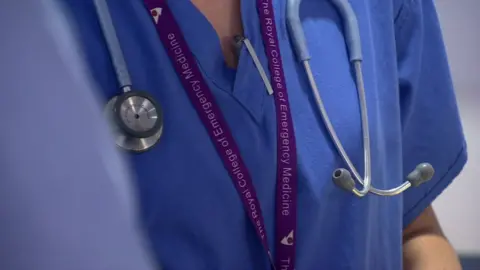Emergency Departments in NI see Christmas surge
 BBC
BBCThere was a 14% increase in the number of patients treated at emergency departments in Northern Ireland this Christmas compared to the same period two years ago.
A total of 15,626 patients were treated in emergency departments from 24 December to 1 January.
The Health and Social Care Board (HSC) says this is a rise of 1,856 on figures from 2015/16.
It urged the public to only attend for urgent and life-threatening conditions.
Some 928 patients waited more than 12 hours for admission, transfer or discharge this Christmas.
"It is an increase year on year and the cumulative effect of that increase in demand is making it very difficult for trusts to be able to manage whenever there are some peaks in activity," Michael Bloomfield, the Deputy Chief Executive of the NI Health and Social Care Board said.
"Over this holiday period there has been a particular increase in acuity and illness of people coming into hospital, that has presented significant challenges," he told BBC NI's Good Morning Ulster programme.

"Many of the people who are waiting over 12 hours are waiting to be admitted and if they need to be admitted they need to be at A&E.
"However, when A&Es are very busy with other people who are taking up clinical time and space that all adds to the pressures on staff trying to juggle all of those competing demands.
"It is those patients who have less urgent conditions who should more appropriately see their GP or indeed a pharmacist."
Some of the other aggravating factors on the health service in Northern Ireland, apart from the surge in demand, include workforce planning, the effect of an elderly population with complex medical needs and a lack of nurses.
Meanwhile, the chief executive of the Northern Ireland Ambulance Service, Shane Devlin, said it was "seeing considerable growth in demand this year compared to last".
"On an average day we've had about 700 calls a day and that may mean that someone coming on a 12 hour shift may see 10 or 12 or sometimes 14 calls on any given day," he said.
'Challenges for ambulance crews'
"In most cases, they are serious, urgent, life-threatening calls which place serious demands on our staff."
Mr Devlin said one of the "biggest challenges is actually getting our crews released from hospitals".
"Obviously if a crew and their patients are standing in a corridor waiting to be released that means they are not available to deal with the next 999 call," he added.
"That has been a considerable growth this year and it's something that adds little or no value to the patients in the community, however, it is a reflection of a system that is exceptionally hot."
On Wednesday, the medical director of the Northern Health and Social Care Trust said the severe pressure on emergency departments this winter is an issue with capacity, rather than performance, and he called for leadership from Stormont.
In the last week of 2017 there were 16,900 waits of over 30 minutes - up by more than 40% on the previous week, NHS England said.
